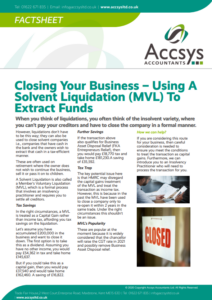Closing Your Business – Using A Solvent Liquidation (MVL) To Extract Funds

When you think of liquidations, you often think of the insolvent variety, where you can’t pay your creditors and have to close the company in a formal manner.
However, liquidations don’t have to be this way; they can also be used to close solvent companies i.e., companies that have cash in the bank and the owners wish to extract that cash in a tax-efficient manner.
These are often used on retirement where the owner does not wish to continue the business, sell it or pass it on to children.
A Solvent Liquidation is also called a Member’s Voluntary Liquidation (MVL), which is a formal process that involves an insolvency practitioner and requires you to settle all creditors.
Tax Savings
In the right circumstances, a MVL is treated as a Capital Gain rather than income tax, affording you tax savings on the liquidation.
Let’s assume you have accumulated £200,000 in the business and want to close it down. The first option is to take this as a dividend. Assuming you have no other income, you would pay £54,362 in tax and take home £145,637.
But if you could take this as a capital gain, then you would pay £37,540 and would take home £162,460. A saving of £16,822.
Further Savings
If the transaction above also qualifies for Business Asset Disposal Relief (FKA Entrepreneurs Relief), then you would pay £18,770 tax and take home £181,230.A saving of £35,592.
Tax Trap
The key potential issue here is that HMRC may disregard the capital gains treatment of the MVL and treat the transaction as income tax. However, this is because in the past the MVL have been used to close a company only to re-open it within 2 years in the same trade. Under the right circumstances this shouldn’t be an issue.
MVL’s Popularity
These are popular at the moment because it is widely considered that the chancellor will raise the CGT rate in 2021 and possibly remove Business Asset Disposal relief.
How we can help?
If you are considering this route for your business, then careful consideration is needed to ensure you meet the conditions to treat the transaction as capital gains. Furthermore, we can introduce you to an Insolvency Practitioner who will need to process the transaction for you.


